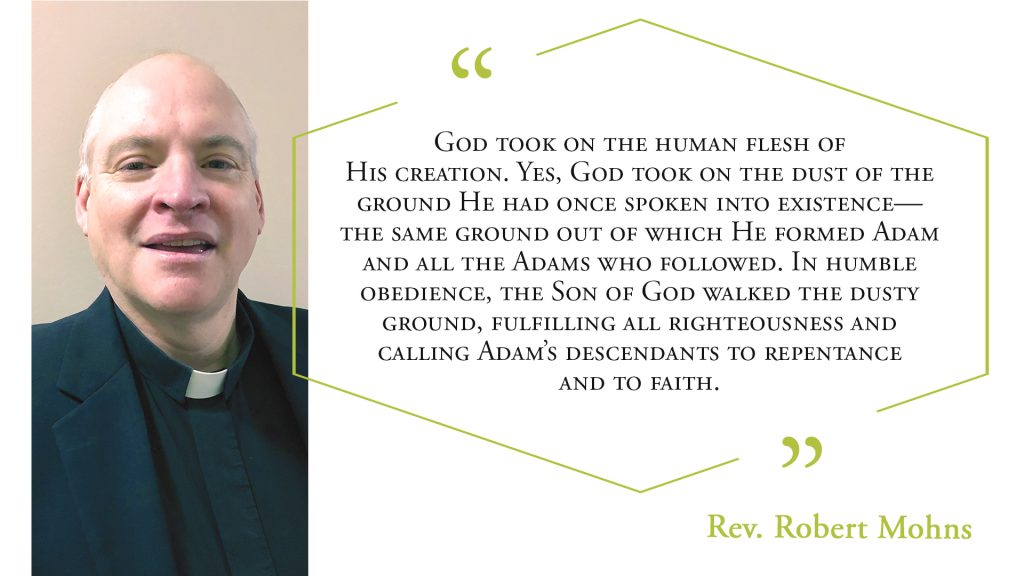You’re Grounded!

by Robert Mohns
“You’re grounded!” “That’s the worst word ever invented,” retorted the teenager, slamming the bedroom door.
For young people, the word “grounded” always seems to have a negative meaning. After one hundred days of mandated social isolation and being locked inside our homes, we might well sympathize with the sentiment. Of course, our grounding is not a disciplinary measure. It is more in line with the original meaning of the word. The word “grounded” comes from the aerospace industry; when pilots failed their physical examination, they were grounded. They could not do their job, and they had to remain on the ground.
The scale and speed of recent social, economic, moral, and institutional turmoil has been breathtaking. Much of what once seemed like foundational truth and bastions of stability have crumbled. Many people are left scurrying about, seeking something else to keep them grounded.
For our physical safety, both ours and others, medical officers have set in place quarantine measures which have seen vast portions of our population staying home. I do not know too many people who have considered this grounding enjoyable.
At the same time, our world has seen large-scale upheaval. The scale and speed of recent social, economic, moral, and institutional turmoil has been breathtaking. Much of what once seemed like foundational truth and bastions of stability have crumbled. Many people are left scurrying about, seeking something else to keep them grounded.
Such is not the case for God’s people. You are grounded! You always have been. You are grounded in the eternal Word of God which never changes (Isaiah 40:8). You are grounded in the one eternal God Himself who never changes (Deuteronomy 33:27). A brief survey of the Scriptures will show you just how grounded you are.
In the beginning, God gathered the waters into one place and said, “Let dry land appear” (Genesis 1:10). God could have made humanity to live in the sky or outer space or in the ocean depths. But He spoke, and dry land appeared. Out of the dust of that ground, He formed Adam, the first human being, from whom all humans would come forth (Genesis 2:7). Talk about being grounded!
In the fullness of time, the Word became flesh. God took on the human flesh of His creation. Yes, God took on the dust of the ground He had once spoken into existence—the same ground out of which He formed Adam and all the Adams who followed. In humble obedience, the Son of God walked the dusty ground, fulfilling all righteousness and calling Adam’s descendants to repentance and to faith.
It was God who preserved Noah and his family when the deluge removed life from the land, and it was God who caused the waters to recede and provided safe harbour for Noah to return to the land (Genesis 5-8). It was God who led Abram to a new land and gave it to him as a possession (Genesis 12). It was God who parted the waters of the sea and led His people back to the promised land on dry ground (Exodus 14:22).
It was God who took His finger to tablets of stone hewn from the ground and wrote His Law and commandments to instruct His people (Exodus 24: 12). It was God in Christ Jesus who later wrote with His finger upon the ground and delivered an adulterous woman from the consequences of breaking the Law (John 8).
It was God who, when asked by Moses to reveal His glory, hid His servant in the ground, in the crag of a rocky cleft, and sealed it with His hand while He passed by (Exodus 33:22). Elijah came to the rocky crag too to hide as His forefather Moses had done, hoping against hope that God would deliver him. There, stuffed in the ground, Elijah received more than the passing-by of God; there God spoke in a small, silent voice His crystal-clear word of deliverance to Elijah (1 Kings 19).
All of Scripture reveals just how grounded we are. We are grounded in God’s Word. We are grounded in God’s creating of us, and we grounded in God’s saving of us.
We are grounded in God’s Word. We are grounded in God’s creating of us, and we grounded in God’s saving of us.
In the fullness of time, the Word became flesh. God took on the human flesh of His creation. Yes, God took on the dust of the ground He had once spoken into existence—the same ground out of which He formed Adam and all the Adams who followed. In humble obedience, the Son of God walked the dusty ground, fulfilling all righteousness and calling Adam’s descendants to repentance and to faith.
He humbled Himself even unto death, death on a cross, where His shed blood flowed onto the ground. His lifeless body was buried, stuffed into the ground, in a borrowed tomb. In the ground He spent the Sabbath’s rest, before being raised by His Father to appear before the disciples and many other followers. And then He ascended to the right hand of His Father, from whence He will come again to bring judgement to the earth and deliverance for His people.
Our grounding does not end there. John foresaw “a new heaven and a new earth!” (Revelation 21:1) Did you read that right? God provides a new earth for His saints to walk upon. Our lives are for always and forever grounded!
And so we bury the bodies of our loved ones in the ground, for God to care for, in the sure and certain hope that He will raise those bodies and set them to live again upon that new earth.
You, dear saints, are grounded! It’s the best word ever! May God keep you grounded in His Word, and may He lead many more to be grounded in it.
———————
Rev. Robert Mohns is Regional Pastor for Lutheran Church–Canada’s West Region.




